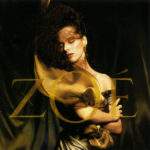
Truly no one is a prophet in their own land. Simply scroll down and look at the all Japanese superstars of boogie, funk, AOR and all other sorts of genres backing up British-born singer Loretta “Zoé” Heywood. Members of Mariah, the elite boogie duo of Yuji Toriyama and Ken Morimura, shall I continue? Mr. Logic System, Matsutake-san, smooth as silk J-Jazz Pop master Jun Miyake, and so on. Zoé’s self-titled debut transforms a mix of known quantities (songs and musicians) and unique originals, to create an album that still sounds like both a time capsule of its time but one pointing at nooks/crannies others are just discovering.
Just 24 years old, Zoé took an unlikely path to explore her musical calling. It wouldn’t be until 9 years later when she left Japan that people outside of Japan would discover her own work within it. When this album didn’t produce the kind of stats CBS/Sony imagined would occur, Loretta would stick it out for a bit longer, singing backup for side joints by Japanese hip-hop crew Major Force, within chill J-Soul group Silk, for like-minded neo-soul songstress Michiru Akiyoshi (aka Monday Michiru) and acid house crew Bomb the Bass. Somewhere, lost in the bustle of trying to make a career for herself post-failure, her original debut was lost to time and stuck in the vaults somewhere, forgotten.

You could hear the massive potential of her debut. Before she came back to Notting Hill, she had a certain something. Influenced by the likes of Gladys Knight, Patti LaBelle, Luther Vandross, Simply Red, and Matt Bianco, Zoé was a gifted singer who also strongly believed in writing her own songs. Her own vocal tone which was equal parts hushed and sophisticated, recall the “quality” people admire in the voices of singers like Diana Ross and Dionne Warwick. Indubitably, if paired with the right conspirators Zoé had the ability to create something special.
Funny thing is that this is exactly what happened. Three truly unique new school Japanese funk composers — Jun Miyake, Masanori Sasaji, and Yuji Toriyama — were tasked with arranging the bulk of this work in Tokyo’s Shinanomachi and SEDIC audio recording studios. Semi-known commodities in the world of J-Jazz/Fusion and J-AOR, the trio had been (give or take three years) lighting it up quietly, writing for others like Yasuko Agawa, Asami Kobayashi, and Janet Jackson. However, if we want to dissect some of the DNA of Zoé we can take some molecules from Yasuko Agawa and add those of Filipino, Japanese Pop star Marlene. This was “Japanese”-made soul music that was aware of forthcoming shifts in make and made.
Somehow, trying to function as the bridge to British soul music Zoé and her cohorts (they all came with special friends in hand — see: Ken Morimura, Takayuki Hijikata, and EVE) wanted to create urban soul music that tried to shift a few gradients away from Japan’s love affair with American soul music. That’s why on Zoé you hear the influence of Loose Ends, Imagination, Freeez and other UK Funky acts that favored minimally-tinged arrangements of the looser variety.

In a way, functioning as a bizarro answer to Marica’s, Sasaji-helmed Jellyfish, this album shines because it’s urbane British feel isn’t quite so British. Imagine transforming two Beatles classic inside out as electro-R&B burners. Imagine “I Want You” as the dancehall-tinged late night jam it was always meant to be. Imagine Tony Joe White’s weepy iconic soul ballad “A Rainy Night In Georgia” as a seductive, quasi-Balearic sooth-sayer.
Mr. Aerobics boogie master Yuji Toriyama really kicks off the album via a peak form soul burner titled “Your Love”. Swooping bass lines plus 808 claves and hi-hats imagine some forgotten peak quiet storm soundtrack in miniature, letting Zoé lay down some of her most chromed-out suave vocals over the boogie buddies’ most luxurious grooves. “My World” brings back Jun Miyake switching into a form that’s like a fiery blend of techno kayo and claustrophobic UK street soul.
We can go back to their fascinating reimagining of “I Want You” as sublime electro-dancehall ballad or skip next, to an original “Bedroom Eyes”. Aided by Hideki Matsutake, as he would help elsewhere on the album, Yuji and Ken once again knock a different kind of urban soul jam out of the ballpark. Full of jittery beats and that panoramic ‘80s R&B production that’s impossibly en vogue now, one doesn’t have to look further than in the post-post-disco work of the Boss herself (with Niles and friends) to see their inspiration in this track. I haven’t even mentioned the fabulous backup vocals of trio Eve, nor the leftfield tropical bridge written by Hideo Yamaki — there’s just myriad little, brilliant things here.

I’ll end this review, that’s getting a bit lengthier than I realized, on a true highlight Zoé’s gorgeous Masanori Sasaji-helmed “Gypsy”. Hovering between melancholia and straight barn burning electro-funk, it’s the essence of Lady Tee, The Jones Girls, and fellow Brit, the little-heralded Linda Lewis, distilled in another cosmopolitan vision of electronic soul whose only goal is to find the spectrum of spirit behind deeply mechanical grooves. Now, for all you British friends, can I ask of you one favor? Attend one of Loretta’s nightly singing stands and tell her: “we’re still huge fans of her work”.
